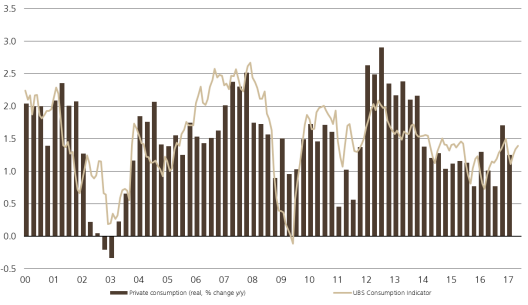The Swiss consumption indicator by UBS shows improvements. The indicator is still distant from the highs in 2012. At the time stronger growth in Emerging Markets and the weaker franc helped the Swiss economy.
The UBS consumption indicator registered 1.39 points in May, suggesting slightly below-average growth in private consumption. This matches the UBS CIO consumption growth forecast of 1.3% in 2017. The data published in June regarding new car registrations and hotel overnight stays by Swiss residents was robust and supported the consumption indicator.
Private consumption vs. UBS Consumption IndicatorZurich, 28 June 2017 – The UBS consumption indicator stood at 1.39 points in May. The April figure was revised downwards slightly, to 1.34 from 1.48. Since the consumption indicator was last calculated in May, data has been published on private consumption and on employment in the first quarter. The actual realized growth in employment during the last quarter was weaker than predicted. Consequently the consumption indicator was revised downwards and has changed momentum in recent months. Despite this downward revision in the consumption indicator, the high-frequency data is in no way indicative of weak consumption. For example, new car registrations in May rose 8% year-on-year, and the latest data on hotel overnight stays by Swiss residents reveals a significant 10% increase on the same month of the prior year. However, both new car registrations and hotel overnight stays are benefiting from the fact that special factors negatively impacted the previous months. The consumption indicator in May indicates growth in private consumption that is slightly below the long-term average. This aligns with the forecast issued by the UBS Chief Investment Office Wealth Management (CIO) that suggested consumption in private households would grow by 1.3% in 2017. Consumption is likely to benefit from rising employment as well as a drop in unemployment as the year progresses. The increase in consumer prices will exert a braking effect, however, as rising inflation will lead to lower growth in real income. |
UBS Consumption Indicator May 2017(see more posts on Switzerland Private Consumption, Switzerland UBS Consumption Indicator, ) Source: ubs.com - Click to enlarge |
How the UBS Consumption Indicator is calculated
The UBS Consumption Indicator signals private consumption trends in Switzerland with a lead time of one to three months on the official figures. At more than 50%, private consumption is by far the most important component of Swiss GDP. UBS calculates this leading indicator from six consumer-related parameters: new car registrations, business activity in the retail sector, the number of domestic overnight hotel stays by Swiss residents, the consumer sentiment index, employment figures and credit card transactions made via UBS at points of sale in Switzerland. With the exception of the consumer sentiment index and employment figures, all of this data is available monthly.
Tags: newslettersent,Switzerland Private Consumption,Switzerland UBS Consumption Indicator






































